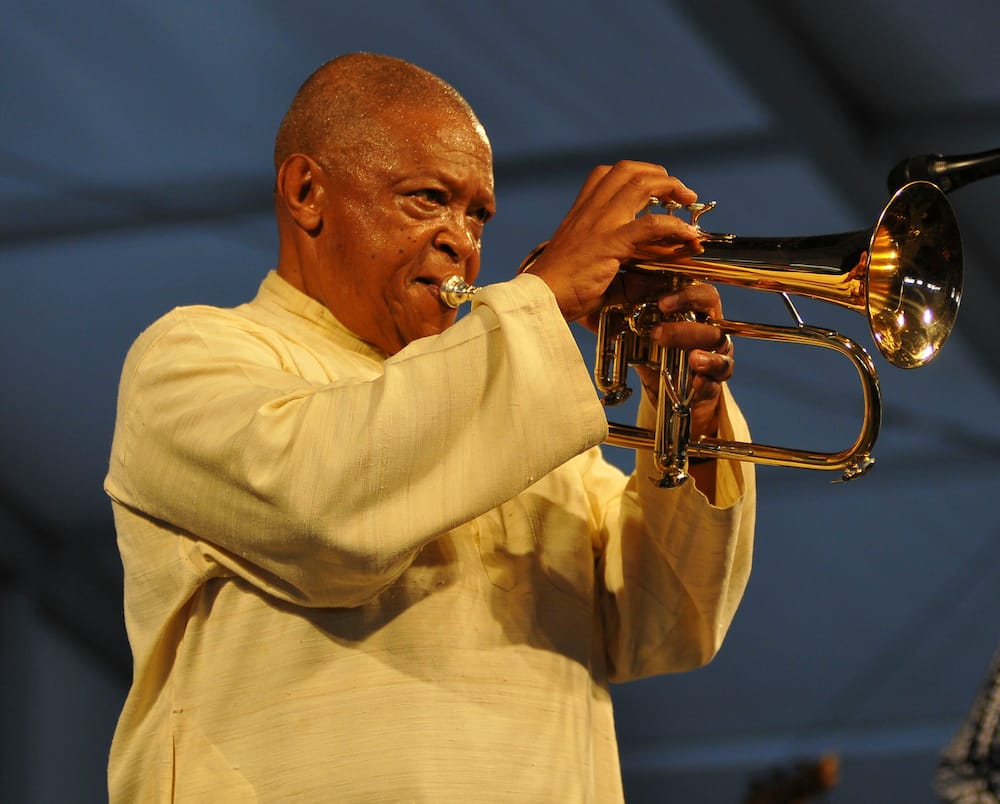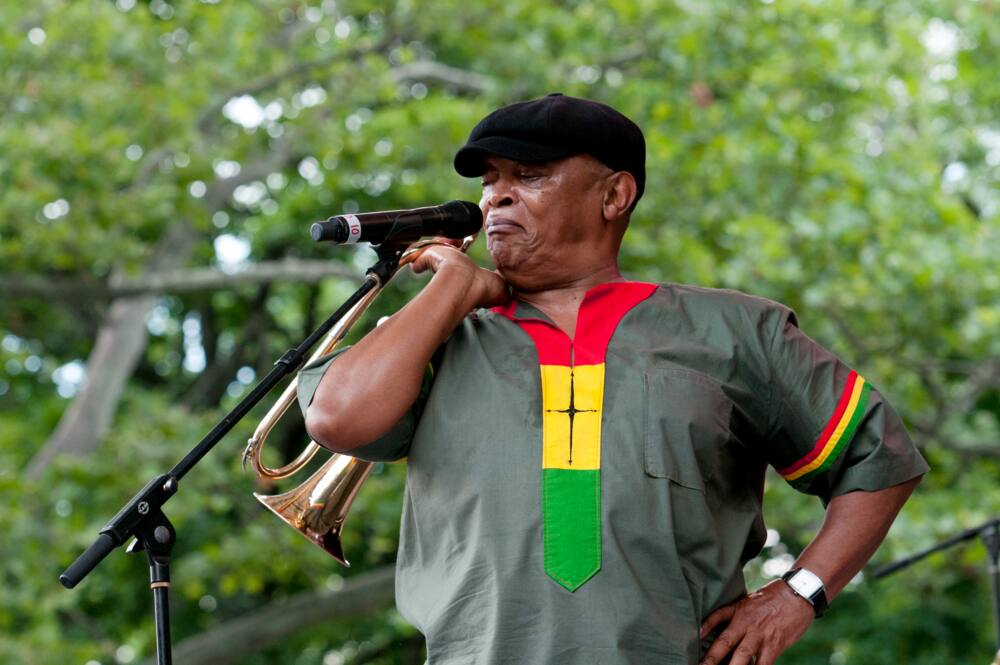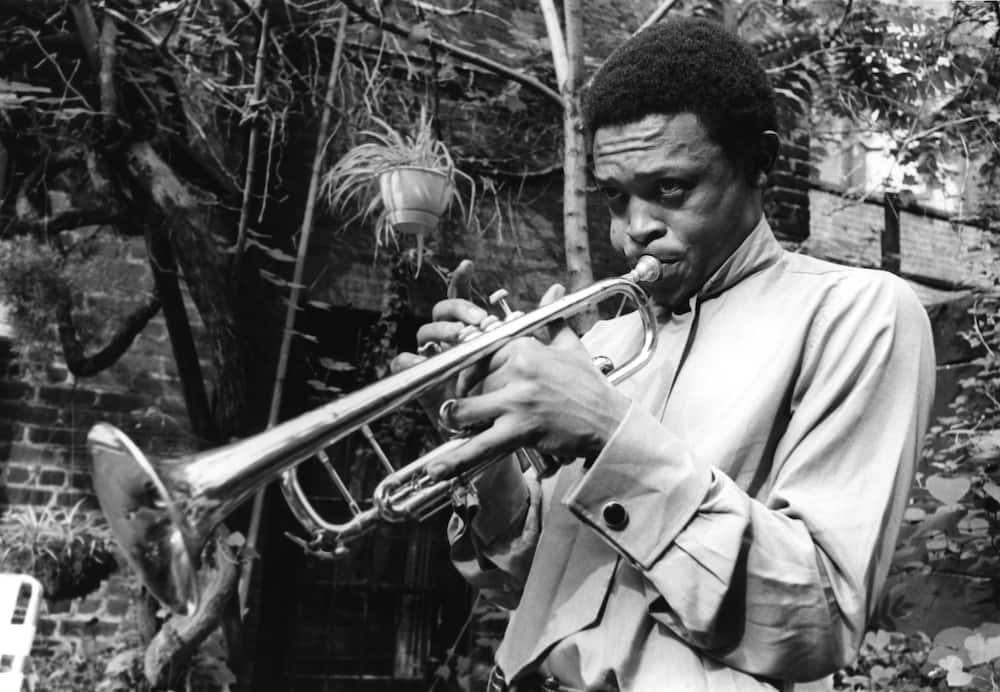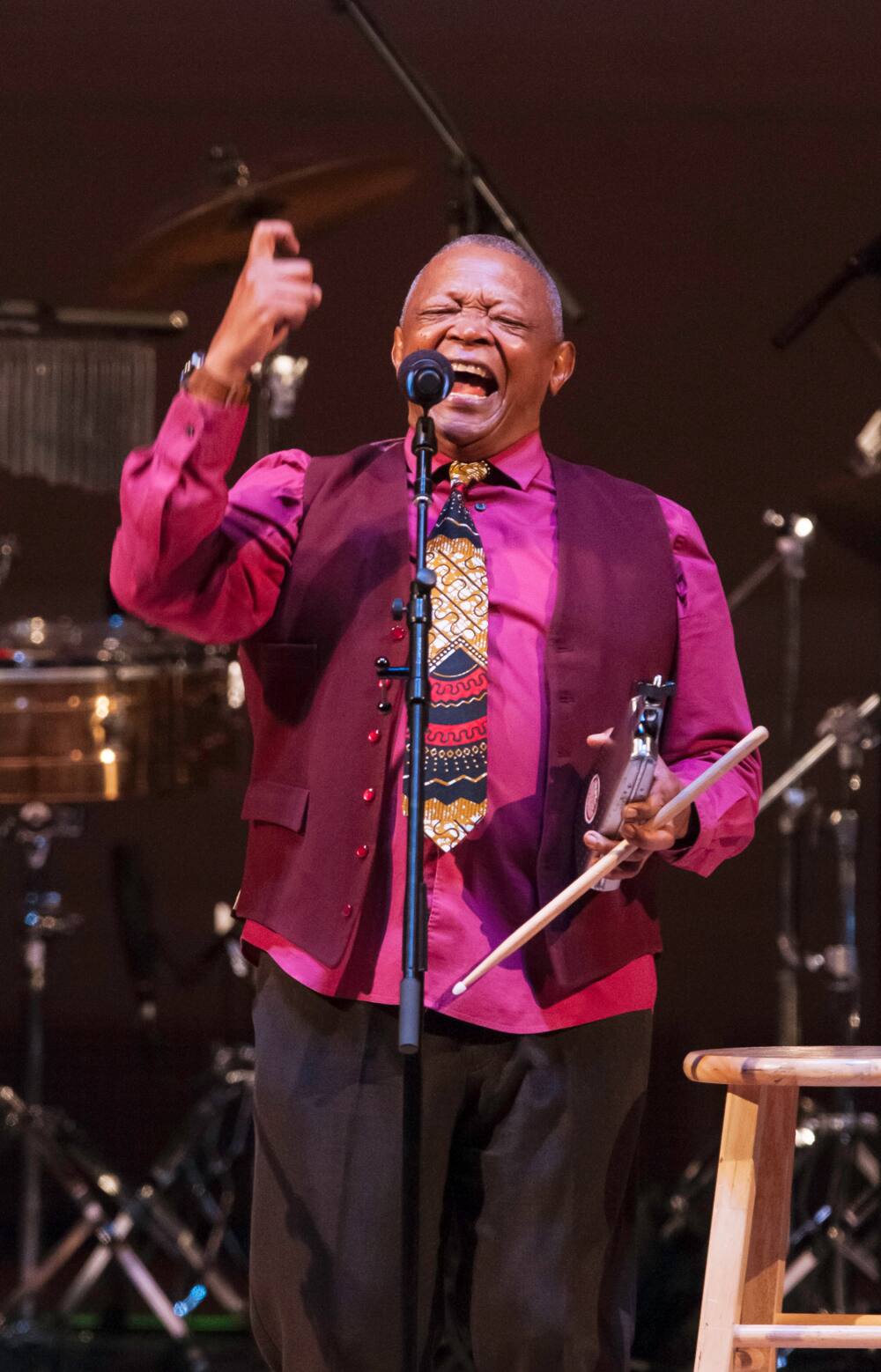Who was Hugh Masekela: all important biography facts to know
Hugh Masekela remains an important figure in the history of music in South Africa. He is fondly remembered as the father of South African jazz. The talented singer, cornetist, trumpeter, flugelhornist, and composer released hit tunes that featured in local and international charts.
New feature: Check out news exactly for YOU ➡️ find “Recommended for you” block and enjoy!

Source: Getty Images
Hugh Masekela developed an interest in music in his childhood years. He played the piano and sang whenever there was a chance. He got his first trumpet in his early teens.
Profile summary
| Full name | Hugh Ramapolo Masekela |
| Gender | Male |
| Date of birth | 4th April 1939 |
| Date of demise | 23rd January 2018 |
| Age at death | 78 years (as of 2022) |
| Place of birth | Emalahleni, Union of South Africa (formerly KwaGuqa in Witbank) |
| Nationality | South African |
| Ethnicity | Black |
| Zodiac sign | Aries |
| Religion | Christianity |
| Sexuality | Straight |
| Height in feet | 5’ 2” |
| Height in centimetres | 158 |
| Hair colour | Black |
| Eye colour | Black |
| Marital status | Divorced |
| Ex-spouses | Miriam Makeba, Chris Calloway, Jabu Mbatha, and Elinam Cofie |
| Partner at the time of demise | Nomsa Manaka |
| Children | 2 |
| Father | Thomas Selena Masekela |
| Mother | Pauline Bowers |
| Siblings | 1 |
| Alma mater | St. Peter's Secondary School, London's Guildhall School of Music and the Manhattan School of Music |
| Profession | Singer, cornetist, trumpeter, flugelhornist, and composer |
Who was Hugh Masekela?
Hugh Ramapolo Masekela was a multi-talented music artist. He composed and sang hit songs. Besides, he was a cornetist, trumpeter, and flugelhornist.
PAY ATTENTION: Click “See First” under the “Following” tab to see Briefly News on your News Feed!
How old was Hugh Masekela when he died?
The famous musician was 78 years old at his time of demise. He was born on 4th April 1939 and took his last breath on 23rd January 2018. His Zodiac sign was Aries.

Source: Getty Images
Where was Hugh Masekela from?
The musician was from South Africa. He was born in Emalahleni, Union of South Africa (formerly KwaGuqa in Witbank), and was based in Johannesburg, South Africa, at the time of his demise.
Family background
The trumpeter's father was Thomas Selena Masekela, a sculptor and health inspector. His mother, Pauline Bowers, was a social worker and his father's second wife. Barbara, his younger sister, is an ANC activist, poet, and educator.
The musician was mainly raised by his grandmother, who operated an illegal bar for miners. Growing up, Hugh sang a lot. He also played the piano.
When he was 14, he watched the 1950 film Young Man with a Horn. He was so fascinated by Kirk Douglas' role in the movie that he took up playing the trumpet.
He got his first trumpet from Archbishop Trevor Huddleston's store. Archbishop Trevor Huddleston was the anti-apartheid chaplain at St. Peter's Secondary School, now called St. Martin's School, Rosettenville.
Educational background
The trumpeter joined St. Peter's Secondary School when he was 12. He was a naughty student who was often in trouble. Naughty students were often reported to Archbishop Trevor Huddleston.
When he got his first trumpet, he promised Archbishop Trevor to stop being naughty. The Archbishop requested Uncle Sauda, the then Johannesburg "Native" Municipal Brass Band leader, to train Hugh how to play the trumpet.
He quickly mastered the art of trumpet playing and inspired some of his schoolmates to play various instruments. The students formed the Huddleston Jazz Band, the country's first youth orchestra.
Upon hearing about the band from Huddleston, Louis Armstrong sent one of his trumpets as a gift for Hugh. In 1956, Hugh joined Alfred Herbert's African Jazz Revue.
He later went to London's Guildhall School of Music and the Manhattan School of Music in New York, United States of America, when he was exiled. He was a student at Manhattan School of Music from 1960 to 1964, where he studied classical trumpet.

Source: Getty Images
Career
Hugh started his music journey in the 1950s, and his experiences inspired his songs during the apartheid period. His aim was to create music to promote and spread political change in the country.
His tracks were about his country's struggles, joys, and sorrows. They mainly addressed apartheid, slavery, and government-related issues.
In 1958, the Manhattan Brothers toured South Africa, and this promoted Hugh to join Todd Matshikiza's orchestra for the musical King Kong. Miriam Makeba and Nathan Mdledle led the orchestr. King Kong was a blockbuster theatrical success.
Towards the end of 1959, the musician and several others formed Jazz Epistles. The group was the first African jazz group to record a long play album. The group performed for audiences in Johannesburg and Cape Town until early 1960.
On 21st March 1960, South Africa witnessed the Sharpeville massacre. Sixty-nine protestors were shot dead on the fateful day, leading to increased brutality of the Apartheid state. This made him leave the country with the aid of Archbishop Trevor Huddleston, Yehudi Menuhin and John Dankworth.
He first went to London, United Kingdom. He befriended Harry Belafonte during a trip to the United States of America, who helped him secure a scholarship.
In America, he released hit pop jazz tunes. These included Up, Up and Away in 1967, and Grazing in the Grass in 1968. In 1967, he appeared at the Monterey Pop Festival. He was later featured in the film Monterey Pop. Hugh Masekela's Grazing in the Grass was one of his best tracks.
In 1974, he collaborated with Stewart Levine to organise the Zaire 74 music festival in Kinshasa. Soon, he became a household name in jazz ensembles. He made special appearances in So You Want to Be a Rock 'n' Roll Star and Lady Friend by the Byrds.
In 1987, he released Bring Him Back Home, a track that became the unofficial anthem of the anti-apartheid movement. It also became an anthem for the movement to free Nelson Mandela. In his career, he collaborated with various artists from West and Central African musicians.
In 1985, he founded the Botswana International School of Music (BISM), which is held to date. He continued working closely with other South African artists upon his return to the country. These included Miriam Makeba, Ladysmith Black Mambazo, and Ray Phiri.
In 1988, he collaborated in the musical development of the successful Broadway play Sarafina! In 1994, Hugh Masekela's Stimela was released. It was compiled and produced by Stewart Levine.
Hugh Masekela's Coal Train was part of the Stimela album. The same year, Hugh Masekela's Hope was released. In 1998, he released Black to the Future. Hugh Masekela's Chileshe was one of the top tracks from the album.
In 2003, he was featured in the documentary Amandla!: A Revolution in Four-Part Harmony. The following year, he released his autobiography called Still Grazing: The Musical Journey of Hugh Masekela.
In 2006, he was named the father of African jazz by Michael A. Gomez, a professor at New York University. In 2010, he was featured in Umlando - Through My Father's Eyes, a show that starred his son.
In 2016, he reunited with Jazz Epistles to mark the 40the anniversary of the June 1976 youth demonstrations.
Albums
The singer released multiple albums in his career that spanned over five decades. Some of his albums are listed below.
| Title | Year | Label |
| Trumpet Africaine | 1962 | Mercury |
| Grrr | 1966 | Mercury MG-21109, SR-61109 |
| The Americanization of Ooga Booga | 1966 | MGM E/SE-4372 |
| Hugh Masekela's Next Album | 1966 | MGM E/SE-4415 |
| You Told Your Mama Not to Worry | 1977 | Casablanca NBLP-7079 |
| Techno-Bush | 1984 | Jive Afrika |
| Waiting for the Rain | 1985 | Jive Afrika |
| Tomorrow | 1987 | Warner Bros. |
| Uptownship | 1987 | Jive/Novus Records |
| Beatin' Aroun de Bush | 1992 | Novus Records |
| Hope | 1994 | Triloka Records |
| Stimela | 1994 | Connoisseur Collection |
| Notes of Life | 1996 | Columbia/Music |
| Black to the Future | 1998 | Shanachie Records |
| The Best of Hugh Masekela on Novus | 1999 | RCA |
| Sixty | 1999 | Shanachie |
| Grazing in the Grass: The Best of Hugh Masekela | 2001 | Sony |
| Live at the BBC | 2002 | Strange Fruit |
| The Collection | 2003 | Universal/Spectrum |
| Still Grazing | 2004 | Blue Thumb |
| Revival | 2005 | Heads Up |
| Almost Like Being in Jazz | 2005 | Chissa Records |
| The Chisa Years: 1965–1975 (Rare and Unreleased) | 2006 | BBE |
| Live at the Market Theatre | 2007 | Four-Quarters Ent |
| Phola | 2009 | Four-Quarters Ent |
| Jabulani | 2012 | Listen 2 |
| Friends (Hugh Masekela and Larry Willis) | 2011 | House of Masekela |
| Playing @ Work | 2012 | House of Masekela |
| No Borders | 2016 | Universal Music |
Hugh Masekela's best songs
Some of the singer's best tracks are listed below.
- Up-Up and Away
- Grazing in the Grass
- Puffin' On Down the Track
- Riot
- Skokiaan
- Bring Him Back Home
- Don't Go Lose It Baby

Source: Getty Images
What is Hugh Masekela's net worth?
At the time of his demise, the singer had a net worth of $1.5 million. Most of his wealth was accumulated from his music career.
Who was Hugh Masekela's wife?
From 1964 to 1966, the musician was married to activist and singer Miriam Makeba. He later married several other women.
He was married to Chris Calloway, Jabu Mbatha, and Elinam Cofie. In the last few years preceding his demise, he lived with dancer Nomsa Manaka.
He was the father of Selema "Sal" Mabena Masekela, a popular American television host, sports commentator, actor and singer born on 28th August 1971. Selema's mother is Jessie Marie Lapierre, a woman of Haitian descent.
In 2010, Selema visited his father's home country for the first time. Hugh took his son to the places he grew up.
He also had a daughter named Pula Twala. Her mother is Motshidisi Jennifer Ndamse.
Why was Hugh Masekela exiled from South Africa?
Following the political unrest surrounding the 1960 Sharpeville Massacre, the musician went into exile. He was exiled in the United Kingdom and the United States of America, where he studied music and pursued music-related endeavours.
What happened to Hugh Masekela?
The trumpeter was diagnosed with prostate cancer in 2008. He battled with the disease for about a decade. He took his last breath on 23rd January 2018, surrounded by his family.
How tall was Hugh Masekela?
The musician was 5’ 2” or 158 centimetres tall. He had black eyes and hair.
Trivia
- On 4th April 2019, he was honoured with a Google Doodle in honour of what would have been his 80th birthday.
- He was nominated for a Grammy Award three times.
- In 2005, he received the Channel O Music Video Awards: Lifetime Achievement Award.
Famous Hugh Masekela quotes
- It's obvious that the rest of the world loves high African culture - African culture, period.
- I've got to where I am in life not because of something I brought to the world but through something I found - the wealth of African culture.
- I am a forward-looking person and live in the moment to build for the future.
- I've always stood on one fact - that all over the world, there are only two things, the Establishment and the poor people. The poor people are a massive majority, and across the world, they are exploited in different kinds of ways. The Establishment depends on exploiting raw materials and the poor.
- I don't think what I do is influenced by suffering. I come from a talented people who are prolific in music and dance.
Hugh Masekela is a famous South African artist who died in early 2018. He was a singer, cornetist, trumpeter, flugelhornist, and composer known for his anti-apartheid songs.
READ ALSO: Who was Hendrik Verwoerd? The untold story of the architect of apartheid
Briefly.co.za recently published Hendrik Verwoerd's biography. Verwoerd was born on 8th September 1901 in Amsterdam, the Netherlands, to Anje Strik Verwoerd and Wilhelmus Johannes Verwoerd.
His family relocated to South Africa in 1903 to sympathise with the Afrikaner nation and help those suffering during the Second Boer War. He went to Lutheran Primary School in Wynberg and Milton High School.
New feature: check out news exactly for YOU ➡️ find "Recommended for you" block and enjoy!
Source: Briefly News











